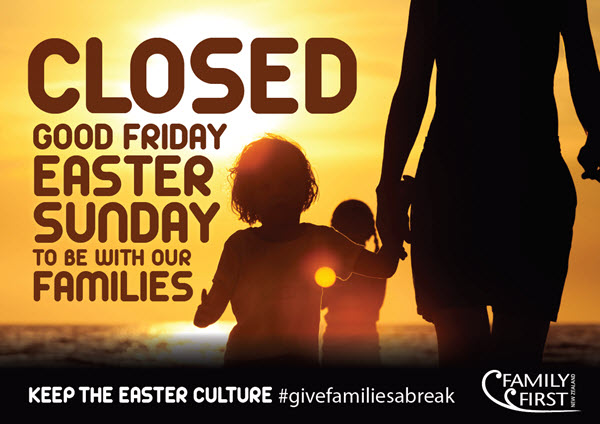Easter isn’t just a religious holiday, it’s a family time
Closing our shops on Good Friday and Easter Sunday and Anzac Day and Christmas Day is actually good for us.
Whether you’re a Christian or not is actually irrelevant.
Public holidays are traditions. They create rituals for families, not based on shopping but on celebrating together, reconnecting, and making memories.
The benefits of a workforce taking holidays as a nation is not quantifiable. Observing religious and cultural holidays is not quantifiable. It is also difficult to quantify the value of work/life balance.
Yet research shows that families want more time together, Kiwis are working too long, and Easter weekend is traditionally about family reunions, family camps and holidays, and for some, church attendance together.
However, this is becoming increasingly difficult as the retail industry is required to work almost every day of the year, and shoppers focus on the holiday specials.
Rabbi Jonathan Sacks in The Politics of Hope said: “Public parks make no economic sense at all. We leave a whole lot of space unbuilt on and not capitalised in any way, but that is not the reason we have them. We have parks because they do us good … they do not make economic sense but they do us good.”
Closing retail stores on certain days of the year doesn’t make economic sense, but they do us good.
Ironically, the liberalisation of the Easter Sunday trading law by the Government has completely failed to solve the problem it was supposed to solve, and has resulted in rushed decisions, often against the majority views of submissions, and inconsistencies across the country.
The only people celebrating this law change will be those who are making money from it. But many Kiwi families who enjoy the Easter break but are in the retail industry will no longer be afforded that luxury.
And why will it stop at Easter Sunday? The justification for liberalising trading laws for Easter Sunday will be the same justification for arguing for the liberalisation of Anzac Day. And Christmas Day. And Good Friday. Is that the ultimate goal?
It’s time that our Kwi identity and culture trumped commercial demands.
In fact, if I had my way, we would also close the shops and give workers a break on Waitangi Day and Labour Day. And perhaps more.
Economic improvement needs to be finely balanced with family and community time. Anzac Day, Easter, and Christmas remain as the few times when the whole country stops and takes a break. This is not an issue about choice as has also been argued. For many workers, they don’t have the luxury of choice as to whether they work or not. Coercion to work will be a very real threat, and we have already heard of examples of that.
To argue that liberalising trading laws is justified because shoppers are able to shop online is a flawed argument. If it was a valid argument, retailers in NZ would have to be open 24/7.
Contrary to the claim, tourists will cope. Many countries have public holidays with shops closed, and tourists simply plan around it, accepting it as part of the local culture and identity. New Zealanders love visiting Pacific Island nations and still manage to enjoy themselves even when everything shuts down on a Sunday. There are two days that the whole of India is closed and they are not religious days. Similar situations apply in other countries, for example Israel, and Islamic countries. The current law is not out of date with international experience.
This is not about a religious holiday time relevant to only a proportion of the population. Anzac Day is also a day where shops must remain closed and has nothing to do with Christian celebrations. Many families do not observe the religious association with Christmas Day but it is still an important and vital family time in our culture.
We should keep the Easter culture. And even duplicate it to other times of the year. Families deserve the break. And it’s good for us.
(Originally published by Stuff in 2017)






